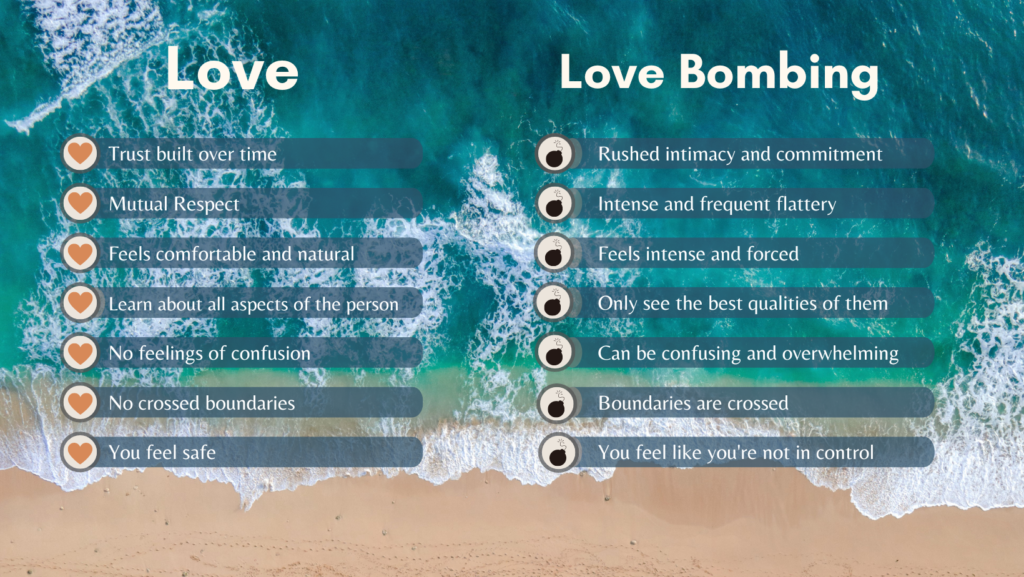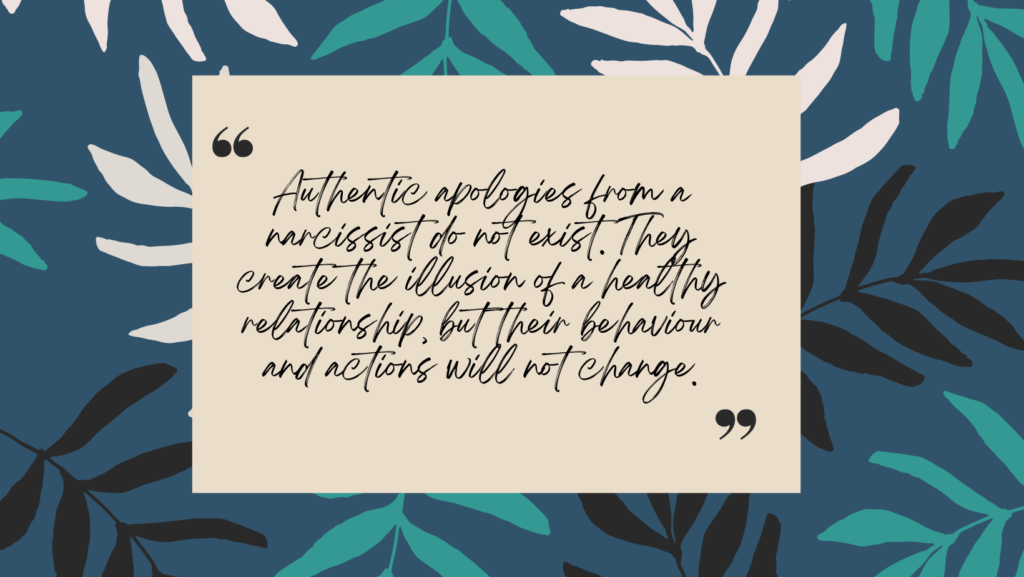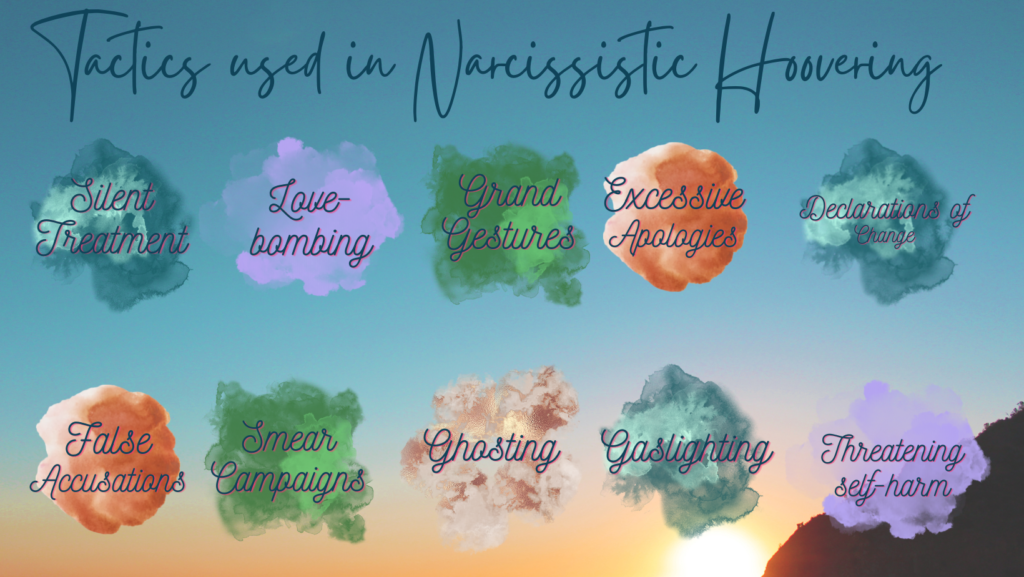Narcissistic hoovering is that stage after a discard, when you’re desperate to stay no contact. But you somehow end up back in a relationship with them.
You know what I’m talking about.
It’s that mega guilt trip feeling that follows after your break up. When they come crawling back with apologetic speeches. Declarations of love and their “I can’t live without you” spiels.
And it doesn’t matter if you broke up with them, they’ll try to suck you back in. Plus there’s no way a narcissist would let you have the last word.
So if they find their supply’s getting low – and they need a restock of power and control – they’ll do that by going back to their ex’s.
And succumbing to their positive or negative hoovering’s, means you’re back in their narcissistic abuse cycle.
10 Common Hoovering Tactics
Thinking back to my ex-narc, the amount of times she hoovered me back in is almost laughable! And now I know better and can see the tactics at play, they’re really obvious to me! And by no means was it a funny experience (dreadful if anything).
But learning about narcissistic hoovering helps you see the signs.
And when you see this vid below, you’ll know what I mean; it’s like they follow a script! She lists examples like they’re plucked from your life and they’re so relatable!
Common Signs of Narcissistic Hoovering
The idea behind narcissistic hoovering is to grab your attention. And they’ll go to great lengths to get it. They’ll either appeal to your positive emotions, like your love for them. Or your negative emotions, like guilt for leaving them.
If one hoovering method isn’t working, they’ll try another. They’ll just keep going until something sticks.
And what they’re trying to do, is to tempt you to respond to them. So if you understand what’s going on, you can then decide if you want to engage with them.
Positive Narcissistic Hoovering Tactics
Narcissistic Hoovering – Love Bombing
When it comes to narcissistic hoovering, it feels like déjà vu. So they’ll resurrect all those charming behaviours you once adored about them. They’re reminding you of what you loved in the beginning.
So back up the pedestal you go, as they drown you in attention. And sweep you off your feet with generosity and kindness. They’re tapping back into those early days when everything felt magical.
And they know you’ve been yearning for it, so they’ll capitalise on that longing. It’s almost too easy for them to pull you back into their web of charm and manipulation. And you and I both know how hard that is to resist – hence how I ended back with my ex so many times.

Narcissistic Hoovering – Grand Gestures
Remember how narcissists like to create a good image for themselves?
Well, they don’t look like a bad guy if they swoop you back in with grand gestures. Now it’s, the loving and giving partner, right? And that kind of generosity sparks you to think: “look at what they’ve done for me”, and “they must really love me”.
So they’re coming across pretty great, and you feel willing to give things another go again. After all, who can say no to gifts and flattery? That’s how hoovering sneaks up on you; you don’t question positive behaviour.
A generous person isn’t seen as abusive.
Narcissistic Hoovering – Excessive Apologies
Narcissists give perfect apologies.
They seem to be taking responsibility for the breakdown in the relationship. They’re desperate for you to hear them out. And they need you to believe that they’re genuinely sorry for the way they’ve acted.
But, they’re not authentic. They’re telling you what you need to hear so that you take them back again. And you know when an apology is fake because they don’t change their behaviour. They just create the illusion they’ll change.
I fell for this too many times. But they’re so compelling and make you believe they’ve seen the error in their ways. So you hope they’ll do better.
My ex would tell me how sorry she was for the way she treated me. And she’d tell me how much she regretted it and wished it never happened.
But after a couple of months, the relationship went back to the same hot and cold cycle as before. And like always, nothing had changed again.
She’d never apologise or take responsibility for her actions when we were together.
But she would after a discard – when we were apart. Because that’s when she would need me again. And she knew if she apologised, that’s how she’d get me back again.
So the hoovering isn’t for you. It’s never about you. It’s all about what they need from you at that time.

Narcissistic Hoovering – Declarations of Change
You know that specific apology you get from a narcissist?
The one where they promise to change?
That it won’t happen again, and that they’re so very sorry?
It’s like they’re finally taking accountability over their behaviour.
And saying all the right things to go with it; they’ll go to therapy and they’ll work on their issues for you.
Only they don’t actually do any of that. It’s just a ploy to get you back. And they’ll say anything to get that outcome.
It’s basically another way to reel you in and get you thinking “this time it’ll be different”. And it shows how willing they are to change for you.
But without actively changing their behaviour, their words are just meaningless.
Anyone can say anything. But the ones who actually mean their words, will show you they’re trying to change. So they’ll be booking therapy appointments and going. Or they’ll go to an AA meeting. They’ll be showing you they mean what they say.
So this fake apology, if you believe it and get sucked back in – which is quite likely – then at least be watching for their actions. Keep note of their promises and time will reveal whether they’ve followed through on them or not.
My ex used to promise to change after every discard. And it was usually after she had tried her other tricks like, gaslighting and ghosting.
So if they weren’t working for her, she always resorted to a grand apology; she’d say she’d go to therapy and get help. And i’d believe her, I’d give her that chance. But once she’d suck me back in again, the same behaviour just kept repeating. And when I was back with her, the decision to leave was always harder.
Negative Narcissistic Hoovering
Narcissistic Hoovering – False Accusations
Narcissists often like to change the narrative of a situation to make themselves look better. So if a relationship has broken down, they’ll make you out to be the bad guy – or that it was all your fault.
You’ll be the one that was cheating.
They’ll say you were the abusive one.
You didn’t pay them enough attention.
They weren’t a priority in your life.
All of which is entirely untrue. A narcissist’s more concerned about the perception of a situation through other’s eyes. Therefore, they’ll do anything to make themselves the “good guy”.
Narcissistic Hoovering – Smear Campaigns
Again, narcissists always want to look like the good guy. So they’ll involve other people to help make them look innocent.
Usually, it’s friends or family of the narcissist. But they’ll try and manipulate anyone into believing their version of the story – especially if it helps to convince you too.
What they’re trying to do is paint you like the bad guy. So they’re swaying people’s opinions to match theirs. They’re intentionally spreading fake info about you to either discredit, control or isolate you.
They’ll play the victim and get people to feel sorry for them, pinning you to look like the abuser. Whilst everyone takes pity on the narcissist instead!
Narcissistic Hoovering – Ghosting; Then Showing up out of the Blue (Silent Treatment)
They vanish without a trace, telling you they’re done, urging you to cut all ties. And then when you finally muster the strength to move on, BAM! They reappear, with a casual “how’ve you been?” text or a surprise visit, armed with flowers and empty apologies.
Every time I decided to distance myself, like clockwork, my ex resurfaced. I swear she had a sixth sense for knowing exactly when I was starting to feel like myself again. A narcissist’s timing’s always impeccable like that!
The cycle was maddening. Apologies and promises flooded in, followed by weeks of silence. Then, out of the blue love-bombing would ensue, only to be followed by another round of ghosting.
I eventually moved back in with my parents, but even then, she’d show up unannounced. And a 40-minute drive out her way wasn’t exactly accidental…
She’d call me, sobbing, and just like that, all the bad would fade, and I’d find myself wanting to comfort her. Crazy how quickly you forget the hell they’ve put you through when they pull at your heart strings like that.
Narcissistic Hoovering – Threatening Self-harm
Once a narcissist feels like you’re on the verge of leaving for good, they’ll pull out all the stops.
They’ll prey on your guilt as a scare tactic because they want you to feel sorry for them – sorry enough to take them back.
So they’re testing your commitment and love for them. And you’ll hear them say things like:
- “I can’t live without you”
- “I’m scared of what I’ll do if you’re not in my life”
- “I’ll end it if you leave”
- “There’s no point in me being here without you”
And what this does is guilt you into staying with them. It’s making you responsible for their pain because you’re scared what they might do if you leave. So it’s manipulative behaviour.
And whilst the threat of self harm should never be taken lightly, it’s not on you to ensure they won’t follow through. So if you’re genuinely concerned for their welfare, you should contact the authorities.
Whenever I tried to distance myself from my ex, she’d resort to extreme tactics. She’d threaten to drive into oncoming traffic if I didn’t agree to meet her again. Or she’d talk about being so depressed that life didn’t seem worth living without me.
I fell into the cycle more times than I should’ve because I felt responsible for her well-being. And that’s because love makes it really hard to separate what’s genuine and what’s manipulation.
But here’s the thing:
If they’re using threats to control your actions, it’s a clear sign of manipulation. Love should never feel like a hostage situation.
Narcissistic Hoovering – Gaslighting
Gaslighting doesn’t just stop at messing with your head. It’s also a sneaky tool narcissists use during hoovering attempts.
First, they’ll deny the reality you know, making you doubt your experiences. Then, they’ll ramp it up by making you feel like you’re the one at fault, like there’s something wrong with you.
So they might downplay past events, making you question your memory. Or twist words until you’re left feeling utterly confused.
The goal of the gaslighter’s to undermine you by devaluing your feelings so that they have complete control over you. Whether this is conscious or unconscious, the effect is still the same.
If you’re told enough times that your feelings are invalid. Or your memory of an event was wrong, in theory, you’ll start believing them. And you’ll doubt yourself too – which is exactly what they want.
My ex was cheating on me, and I could sense it deep down. But every time I tried talking about my worries, she dismissed me as “jealous and paranoid”.
She’d say things like:
- “It’s all in your head”
- “You’re just insecure”
- “You don’t want me to have friends”
- “You’re crazy”
- “You need to go on medication; something’s wrong with you”
- “You know I wouldn’t do that to you”.
She even convinced me that my acne medication was making me paranoid, so I stopped taking it. When my suspicions didn’t fade, she suggested I go on anti-depressants, insisting the issue was with me, not her. It was a confusing and hurtful situation, where she constantly shifted the blame, making me feel like I was the problem.
So you can see how the gaslighting is a tool to get you doubting your perception of things. Denying the cheating is part one. And then turning it back on you – to make you think you’re making it up – that’s gaslighting at work.
If you feel confused and unsure of yourself, tune into those signs and don’t ignore them. Don’t go back to them if you haven’t got a clear head.

Ways to Stop Them Sucking you Back in
Go no contact
I cannot stress enough how important it is to cut off all contact. You’re directly cutting the line of communication. So you’re not allowing them to suck you back in.
Block their number, delete their socials, and remove pictures of you and them. You don’t want to be tempted to see what they’re up to. Or to look back on all the “good times”.
It took me a long time and many abusive cycles to do this. I kept trying but then I’d cave and unblock her – she would notice every time and pop back into my life.
It was brutal and heartbreaking when I finally blocked her for good. But within a couple of weeks, I could feel her hold slowly releasing. And I started to see glimpses of the person I was before, and I didn’t want to lose that again if I went back to her.
I considered myself lucky because the only ties I had was the living situation; we weren’t married. So once she moved out, I could finally start rebuilding my life.
Go low contact if you have kids
If you have kids, no contact isn’t going to be a straight cut option for you. But, you can still have strong boundaries in place and keep to low contact.
And low contact would be light and disengaged. So you’d only keep to conversations about the kids. Nothing deep or personal, just basic chit chat. You want to try and model healthy communication for your kids. Because they’ll already be rattled with the separation, so you don’t want to make things worse for them.
Get therapy
Get yourself a therapist who understands narcissistic abuse. They’ll help you to navigate the challenges that come with healing.
Laura and I struggled relating to our friends about our experiences. They just didn’t get how complex it was to get over a relationship with a narcissist.
They can say harmful things like “get over it already”, or “why can’t you just move on?”
But you and I know, it isn’t that simple. Once you’ve been stuck in these vicious cycles for some time, they damage your core beliefs of who you are. And they can have lasting effects on your future relationships too.
It’s not uncommon to get CPTSD from long term emotional abuse. And the lingering effects of it can easily be misunderstood for depression and anxiety. So unpicking and understanding what’s happened to you is vital for you to move forward.
Recognise the abuse
It can take a while to come to terms with the fact that your relationship was abusive.
Because there wasn’t any physical violence, you often overlook the red flags. You normalise them and accept its just your relationship dynamic. And it’s difficult to grasp what’s abusive if you don’t know what you’re looking for.
So you end up making excuses for their behaviour, or blaming yourself instead. And it’s a lot easier to blame yourself than to accept your partner – who’s supposed to love you – is abusing you.
What helped me to understand my relationship was learning about the narcissistic abuse cycle. It made things relatable as I could see the patterns in my own relationship. And once you notice that, you can’t un-see it. It’s like the final piece you need to make sense of it all.
Practice self-love and patience with yourself
One of the key things to recovery is rebuilding your sense of self. And there’s no one size fits all approach, you’ve got to find what works best for you.
So do the things you love. Explore new hobbies and interests, reconnect with old friends. Perhaps find a community who get what you’ve been through.
Relating to similar experiences helps remove the shame you feel. Because you’re no longer alone in your pain. It’s like knowing someone who watches the same TV series you do – there’s instant camaraderie.
And when you’ve been quite isolated, it’s so important to fall back in love with the things you enjoy to do. So give yourself time to explore that again.
You’ll still have your ups and downs. But if you can find something that slaps a big smile back onto your face, then it’ll help you a lot with your healing.
Be kind to yourself, have patience and trust the process.
Set clear boundaries
B is for boundaries, a BIG part of your recovery. And that’s basically figuring out what you will and won’t tolerate going forward.
Just a quick tip from me to you:
Avoid dating apps when you’re still healing and vulnerable.
Because what can happen – when you’re totally not ready yet – is the memory of how awful your ex was, fades.
So the hurt you felt starts to blur. And suddenly, you’ll find yourself putting up with similar behaviours from new potential partners. And you risk tolerating things you swore you’d never endure again. But being aware of that can help you stay true to your standards and avoid falling back into old patterns.
You need to know your boundaries before entering another relationship. So you’re less susceptible to the manipulation you experienced before.
Owning what happened to you is the only way to ensure it doesn’t happen again. And if you can learn to model what you want in a relationship, it’ll be clear when someone doesn’t meet those standards.
Awareness is key for spotting hoovering
It ain’t easy to avoid hoovering and it happened to me a lot! But knowledge is your strongest shield. And that’s something I didn’t have when I went through it.
You now know the manipulative tactics narcissists use. And you understand how they attempt to draw you back in. So if you’re armed with awareness, you’ve better protection to stand firm.
Look out for the signs, trust your instincts, and most importantly, focus on your self-worth. You deserve love and respect that uplifts you, not a toxic cycle that drags you down.
If you keep finding yourself hoovered back in – and you want to put a stop to it – use this strategy here.
